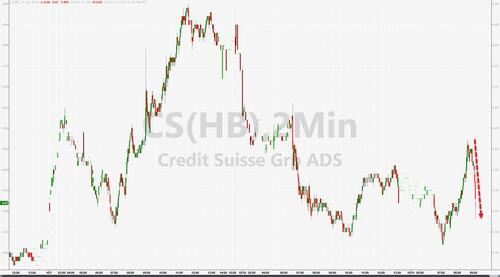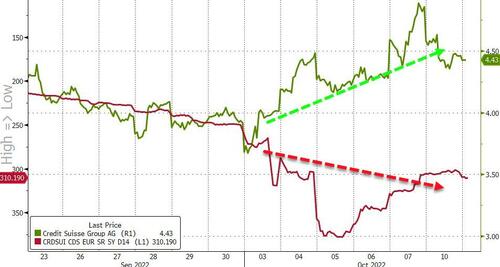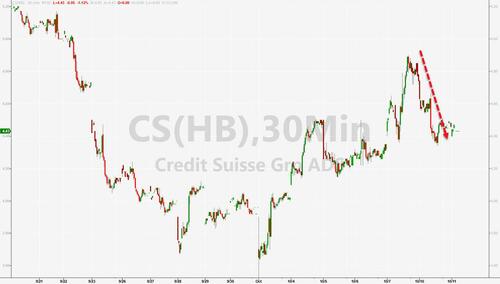
Update (1215ET): Credit Suisse just can't catch a break as, on top of all the systemic fragility and financial instability, Bloomberg reports the US Justice Department is investigating whether CS continued to help US clients hide assets from authorities, eight years after the bank paid a $2.6 billion tax-evasion settlement and pledged to tackle the issue.
The Justice Department has examined allegations raised by whistleblowers who said Credit Suisse bankers “continued to assist additional Americans with concealing assets from the United States after 2014,” according to a court filing last November.
“Despite recent tough talk from DOJ about holding repeat corporate offenders accountable, nothing has happened to Credit Suisse,” said Jeffrey Neiman, an attorney for the whistleblowers.
“They have gotten away with lying to the United States at the expense of the American taxpayer.”
The Zurich-based bank denies improper conduct, and says it’s cooperating with US authorities.
“Credit Suisse does not tolerate tax evasion,” the bank said in a statement.
“We have implemented extensive enhancements since 2014, to root out individuals who seek to conceal assets from tax authorities. Our clear policy is to close undeclared accounts when identified, and to discipline any employee who fails to comply with bank policy or falls short of Credit Suisse’s high standards of conduct.”
Never mind the denials, investors are selling first...
The investigations add pressure on a bank seeking to deliver a strategy that will revamp its risk culture, downsize its unprofitable investment bank and return it to profitability.
* * *
The last week has seen Credit Suisse's stock price rallying despite an ongoing increase in the market's perception of the embattled bank's credit risk.
However, after a Goldman Sachs report overnight assessing CS' strategic options, share prices are sliding back down towards credit's reality...
“Credit Suisse continues to face cyclical and structural challenges,” Goldman analysts wrote in a note, maintaining a sell recommendation on the stock.
Weaker earnings coupled with RWA inflation and the risk of continued litigation and restructuring costs, create capital pressures.
Disposals may provide some relief, but sector P/B multiples are at depressed levels: we estimate a sale of Securitized Products could improve 2023/24E CET1% by 30-33bps. Overall, we estimate a potential capital shortfall of CHF4-8bn in 2024 when analysing CS’ capital position given various CET1 targets and litigation/restructuring costs, and in our base case (no restructuring), 2024E CET1 excess falls to CHF3bn.
Given our view that the IB requires restructuring while capital generation is minimal, we now view an equity raise as prudent to preserve a buffer.
Goldman’s comments were echoed by Jefferies analyst Flora Bocahut, who said in a note on Tuesday that Credit Suisse needs to build about 9 billion Swiss francs of capital in the next two-to-three years.
But given the dilutive nature of a capital increase, Bocahut expects it to prioritize asset disposals, she wrote in a note.
Bloomberg News reported Friday that bidders are lining up for the bank’s securitized products unit, a key pillar in the downsizing of its investment banking operations.
Given market conditions and the fact that Credit Suisse is a “forced seller at the moment,” Vontobel analyst Andreas Venditti is “pretty sure they’re not going to get the highest bids one would wish for in this environment,” he said by phone.
The sale process, which is far advanced, has drawn interest from Pimco, Sixth Street and an investor group including Centerbridge Partners.
As the bank tries to avoid what would be an expensive capital raising, it is also exploring the sale of the Mandarin Oriental Savoy Zurich, Bloomberg News reported last week.
Update (1215ET): Credit Suisse just can’t catch a break as, on top of all the systemic fragility and financial instability, Bloomberg reports the US Justice Department is investigating whether CS continued to help US clients hide assets from authorities, eight years after the bank paid a $2.6 billion tax-evasion settlement and pledged to tackle the issue.
The Justice Department has examined allegations raised by whistleblowers who said Credit Suisse bankers “continued to assist additional Americans with concealing assets from the United States after 2014,” according to a court filing last November.
“Despite recent tough talk from DOJ about holding repeat corporate offenders accountable, nothing has happened to Credit Suisse,” said Jeffrey Neiman, an attorney for the whistleblowers.
“They have gotten away with lying to the United States at the expense of the American taxpayer.”
The Zurich-based bank denies improper conduct, and says it’s cooperating with US authorities.
“Credit Suisse does not tolerate tax evasion,” the bank said in a statement.
“We have implemented extensive enhancements since 2014, to root out individuals who seek to conceal assets from tax authorities. Our clear policy is to close undeclared accounts when identified, and to discipline any employee who fails to comply with bank policy or falls short of Credit Suisse’s high standards of conduct.”
Never mind the denials, investors are selling first…
The investigations add pressure on a bank seeking to deliver a strategy that will revamp its risk culture, downsize its unprofitable investment bank and return it to profitability.
* * *
The last week has seen Credit Suisse’s stock price rallying despite an ongoing increase in the market’s perception of the embattled bank’s credit risk.
However, after a Goldman Sachs report overnight assessing CS’ strategic options, share prices are sliding back down towards credit’s reality…
“Credit Suisse continues to face cyclical and structural challenges,” Goldman analysts wrote in a note, maintaining a sell recommendation on the stock.
Weaker earnings coupled with RWA inflation and the risk of continued litigation and restructuring costs, create capital pressures.
Disposals may provide some relief, but sector P/B multiples are at depressed levels: we estimate a sale of Securitized Products could improve 2023/24E CET1% by 30-33bps. Overall, we estimate a potential capital shortfall of CHF4-8bn in 2024 when analysing CS’ capital position given various CET1 targets and litigation/restructuring costs, and in our base case (no restructuring), 2024E CET1 excess falls to CHF3bn.
Given our view that the IB requires restructuring while capital generation is minimal, we now view an equity raise as prudent to preserve a buffer.
Goldman’s comments were echoed by Jefferies analyst Flora Bocahut, who said in a note on Tuesday that Credit Suisse needs to build about 9 billion Swiss francs of capital in the next two-to-three years.
But given the dilutive nature of a capital increase, Bocahut expects it to prioritize asset disposals, she wrote in a note.
Bloomberg News reported Friday that bidders are lining up for the bank’s securitized products unit, a key pillar in the downsizing of its investment banking operations.
Given market conditions and the fact that Credit Suisse is a “forced seller at the moment,” Vontobel analyst Andreas Venditti is “pretty sure they’re not going to get the highest bids one would wish for in this environment,” he said by phone.
The sale process, which is far advanced, has drawn interest from Pimco, Sixth Street and an investor group including Centerbridge Partners.
As the bank tries to avoid what would be an expensive capital raising, it is also exploring the sale of the Mandarin Oriental Savoy Zurich, Bloomberg News reported last week.









